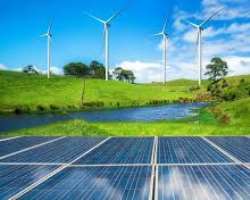Revolutionalisng Nigeris’s Msmes,using Off Grid Renewable Energy Solution

With the evolving changes emanating from climate and environmental issues in all parts of the world, man has been saddled with the responsibility of finding lasting solutions to these problems. Nigeria as the most densely populated black nation in the world has been faced with serious energy deficit which have adversely affected the growth of the Micro Small and Medium Enterprises (MSMES). In the quest to meet up with the increasing demands on performance and the need to maximize cost for profit, alternative local and cheap measures have always been the major energy source adopted to enhance products and services in Nigeria.
Many homes and restaurants resort to the use of firewood and kerosene for cooking, especially for larger families, groups, parties, etc mainly due to the availability, inexpensive nature of firewood and lack of access to modern cooking fuels, However, a great number of households are not aware of the health implications and hazards that are associated with cooking with firewood. Also not knowing a better alternative, many of users of kerosene do not only know the health hazards which include indoor air pollution and high volatility of the product when it is adulterated, but also don’t know that kerosene is more expensive to buy.
Fire wood is considered as the oldest form of cooking. The vast majority of households in rural areas cook with firewood, which is known to produce various airborne toxins. Traditional open fire and stoves which are mainly fueled by fire wood and kerosene come in handy for domestic cooking and heating. The use of these methods of cooking in the rural areas has continued to dominate the region. The smoke and toxins emitted can lead to an endless list of health problems such as heart diseases, lung cancer, low birth weight, impaired vision, increased respiratory symptoms, such as irritation of the airways, coughing, or difficulty breathing, decreased lung function, aggravated asthma, development of chronic bronchitis, irregular heartbeat, non-fatal heart attacks andpremature death in people with heart or lung disease. This impact is larger for women and children than for men due to the known fact that they are more familiar with the harvest and usage of these dirty energy sources. The use of locally made lanterns is also a major source of concern, especially because, they provide poor visual light that result in very serious eye defect and damage. These health problems are a great threat to human existence. Hence, it is important to provide MSMEs unlimited access to clean, safe and affordable cooking options.
The success of many SMEs can be linked strongly with the method of energy used to run the businesses. Availability of electricity is usually a major restriction, especially at night and as such, limits the time for business operations. Using renewable energy to power street light will boost activities during night hours. In the rural areas many SMES still make use of locally made lanterns for illumination, especially when it is dark or at evening hours. To reduce the ongoing damage caused by the use of dirty sources, time is now to provide MSMES increased access to clean, safe and affordable energy options, because they are non-pollutant and non-contributor to greenhouse gas that contribute to global warming.
Renewable energy plays a major role in the reduction of the health and environmental problems, experienced in most areas. Renewable energy fuels are derived from natural and available resources and this makes it easy to harness. One major advantage of renewable energy is that, it is sustainable and will not run out and this increases the efficiency of the activities of MSME. Renewable energy facilities generally require less maintenance because as the name sounds, its sources which include the sun, wind, hydro etc. renew themselves.
To provide sustainable businesses that can improve the economy of Nigeria, the government and other charitable organizations should see the need to provide grants, low interest finance, tax havens and other financial options to help them run these businesses effectively.Local governments can lead by example by generating energy on–site, purchasing green power, or purchasing renewable energy. Using a combination of renewable energy options can help meet local governments’ goals, especially in some regions where availability and quality of renewable resources vary.
Manufacturers and wholesalers of these products and services should endeavor to provide energy options at rates that the MSMES can afford and have confidence in. This will go a long way in encouraging their businesses, increase capacity level and curbing the health and environment hazards that have been a threat to the human existence for a long time.
Educational programmes should be organized to inform and educate rural dwellers on the negative implications of using these traditional and local forms of energy. They should also be provided with ample information on the advantages of renewable energy over other forms of energy, and how it can be used to overturn their lives and businesses.
Mrs. Akunna Sophia Ofili is a Senior Programme Officer, Climate Transformation and Energy Remediation Society (CLIMATTERS), Abuja [email protected]
